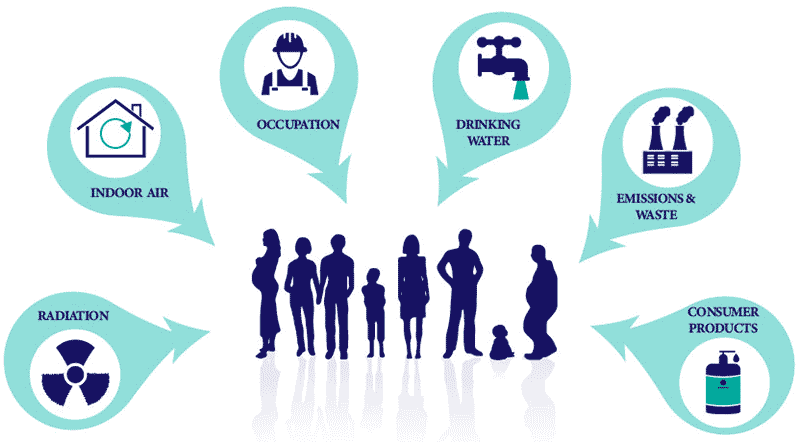On this page...
Overview
Humans are exposed to a wide variety of chemical and physical agents throughout the course of their lives. These agents can have profound effects on human health, including cancer. A growing number of chemical and physical agents have been comprehensively reviewed and classified as carcinogens by the National Institute of Environmental Health Sciences’ National Toxicology Program.

The complex nature of human exposures to chemical and physical agents presents a challenge to research in this field. This complexity can be attributed, in part, to the numerous mixtures in the environment, fluctuations in dose over time, and different routes of exposure. Gaps remain in our understanding of the mechanisms of carcinogenesis resulting from chemical and physical exposures, including the assessment and impact of exposures throughout biologically relevant time periods and life stages. In addition, the health effects of exposures to the multitudes of chemical mixtures humans experience are poorly understood. Advancements in methodologies to investigate complex, dynamic exposures throughout human life are providing new opportunities to address these research gaps.
NCI’s Epidemiology and Genomics Research Program is committed to supporting the study of chemical and physical agents, their contribution to and effects on cancer risk, and the advancement of methodological developments to improve these efforts.
Funding Opportunities
EGRP joins with other NCI Divisions, Offices, and Centers and other Institutes and Centers at the National Institutes of Health (NIH) to fund grant applications submitted in response to notices of funding opportunities.
View other EGRP, NCI, and NIH funding opportunities
EGRP also encourages investigator-initiated grant applications on topics related to chemical and physical exposures.
Selected Projects
Examples of current and past collaborative projects related to chemical and physical exposures in which EGRP staff are involved:
- Cohorts for Environmental Exposures and Cancer Risks

- Breast Cancer and the Environment Research Program

Related Research Resources
NCI Supported Resources
- Human Health Exposure Analysis Resource

- Cancer-Causing Substances in the Environment
- Network of Exposomics in the US

NIH-Supported Resources
Other Resources
- National Institute for Occupational Safety and Health Carcinogen List
- Occupational Safety and Health Administration Carcinogens
- Centers for Disease Control and Prevention, Agency for Toxic Substances and Disease Registry
- US EPA Integrated Risk Information System (IRIS)
Related Workshops and Meetings
EGRP is dedicated to ensuring that our recorded webinars comply with Section 508 of the Rehabilitation Act (as amended) for individuals who are hearing and sight impaired. If you encounter any recorded webinar that does not meet your needs, please feel free to reach out to NCIEpiCommunications@mail.nih.gov.
- Molecular Signatures of Exposure in Cancer - A Joint NIEHS and NCI Workshop (June 29-30, 2023)
- National Institute of Environmental Health Sciences: Exposure Science and the Exposome Webinar Series

- International Society for Exposure Science Annual Conference (September 2020)
